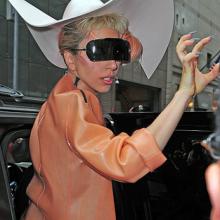Lady Gaga
In a powerful introduction to an even more moving song from Lady Gaga, Vice President Joe Biden appeared at the Oscars Feb. 28 in a plea to “change the culture” and ensure that “no abused woman or man…ever feel they have to ask themselves ‘what did I do?’”
Unlike her previous music videos, known for their theatrics and intricate dance numbers, Lady Gaga’s new video “ Til It Happens to You” opens on a simple black and white shot of a college dorm. Like most dorms across the country, the walls are sparse cinderblock, the floors are tiled, and the desk and beds are made of heavily lacquered pinewood.
Like many dorms across the country, this set is the scene of multiple sexual assaults. More than one-in-five women are sexually assaulted or raped on college campuses each year. Lady Gaga’s video was made in conjunction with the documentary film on campus rape, The Hunting Ground, and the stories her video portrays are both unique in their details and disconcertingly familiar.
There are harrowing scenes to watch, but the video does not end on the nights of the assaults. Each survivor has to deal with the trauma in her own way. They pull away from their friends. One fears the bathroom and stops showering. The two friends are unable to talk about what happened and one drops out of school.
Kelly Clarkson’s latest single is a pop culture anthem with a catchy tune. It’s called “People Like Us” and it has a spiritual depth that struck me when I first heard the song.
Clarkson identifies with certain people in the song – “people like us.” Who are people like us? Cultural scapegoats, outcasts, marginalized, misfits, and the damned.
People like us we’ve got to stick together
Keep your head up, nothing lasts forever
Here’s to the damned, to the lost and forgotten
… We are all misfits living in a world on fire
Some may criticize Clarkson’s motivation for identifying with cultural scapegoats. After all, she’s been a pop culture diva since her appearance on American Idol more than a decade ago. Is she identifying with the marginalized because ever since Lady Gaga did it in 2011 with Born this Way it’s now the cool thing to do?
Whatever her motivations, I think it’s amazing that it has become “cool” to identify with cultural outcasts. And as opposed to criticizing her motivations, I want to affirm them. Whether Clarkson realizes this, as a powerful and influential person who identifies with cultural “misfits” and the “damned,” what she is doing in “People Like Us” is modeling an example of Christ-like love.
South Korean Christians are trying to pray away Lady Gaga.
According to AFP, a group of Christians gathered Sunday night to pray and protest Gaga’s concert, scheduled for April 27.

Lady Gaga. Image via http://bit.ly/AjdhWA
During all my reading about Robyn and Lady Gaga I came across some stuff about Lady Gaga that I found interesting, theologically speaking. As I told Jana over the summer, "I'm sort of developing a theological curiosity about Lady Gaga." Jana asked, "How so?"
Well, Lady Gaga calls her fans "monsters." Or "little monsters." And by that she means freaks--the odd, the weird, the lonely, the rejects, the nerds, the castoffs. And you can't help but wonder, in light of the gospels, about that demographic. In my book Unclean I have a chapter on monsters. And I've written about the theology of monsters on this blog. Consequently, Lady Gaga's use of the label "monsters" caught my attention.
Because as I've written, the category "monster" is charged with ambivalence. On the surface the monster is a normative threat--a defilement, a degradation, a location of moral and communal harm. Thus, monsters are expelled from community. And yet, most monster stories suggest that the monster is often a scapegoat. That the monster is more victim than victimizer. Underneath, if we could but see it, the monster is one of us.
So it's theologically apt that Lady Gaga uses the category monster for her fans. Because she's targeting a group that has been cast out of society. Again, she's explicitly embracing the freaks, weirdos and social outcasts. But Gaga, like in the monster stories, has flipped this and made the label "monster" a term of affection, welcome, embrace, community, inclusion and hospitality. (The diminutive "little" signals the playful affection.) This parallels my own interests in Unclean--Can we show hospitality toward monsters? So I'm intrigued by Gaga's community of "little monsters."



